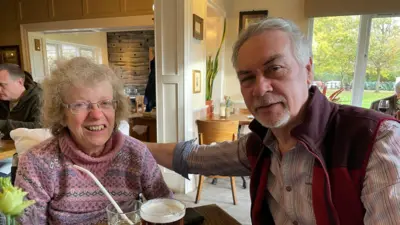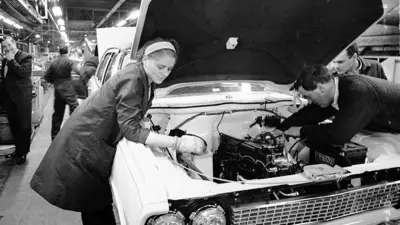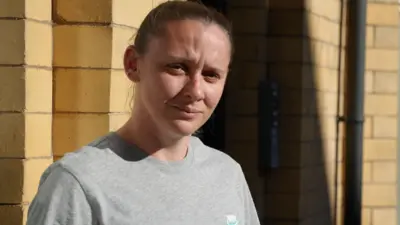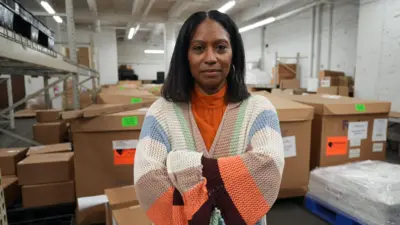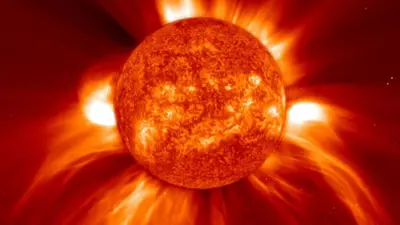We've updated our Privacy and Cookies Policy
We've made some important changes to our Privacy and Cookies Policy and we want you to know what this means for you and your data.
Widow's relief as remains found in 'Disappeared' search
Image source, Other
The widow of a man believed abducted and murdered by the IRA in 1981 said she felt sad but relieved that her husband's remains appeared to have been found.
Charlie Armstrong, 57, from south Armagh went missing on his way to Mass.
The human remains found during a search in County Monaghan have been removed to Dublin for further examination.
Kathleen Armstrong said she was grateful for those who seemed to have found his body.
She said she would forgive those responsible for her husband's murder if it was confirmed that his remains had been found.
She also said she had never blamed the IRA for his death.
"All I want is his remains now and then I am satisfied," she said.
"I dont want any ill-feeling with anyone over it.
"I wouldn't blame anybody, because I don't know.
"I feel a sense of relief, I hope that God is true and that I will get him home.
"I want to have a grave to go to."
Irish police have preserved the area where the remains were found as a crime scene, and a post mortem examination is being carried out on Friday.
Mr Armstrong's family believe he was abducted and murdered by the IRA.
He is one of the so-called "Disappeared" - the 14 men and women abducted and killed by republican paramilitaries at the height of the violence in Northern Ireland.
The Independent Commission For the Location Of Victims' Remains said the formal identification process would take some time.
Frank Murray of the commission said the identification process could take up to four weeks.
"We can't be absolutely confident it is him but we have for some time been conducting a focused search on the site for Charlie Armstrong and nobody else," he said.
"We did find skeletal remains, but it will require DNA examination to establish the precise identity.
"The commission received different threads of information at different times. It's a very difficult site; a strange mixture of a quarry and a bog, and waterlogged most of the time."
Mr Murray confirmed searches were continuing in Counties Monaghan, Meath and Louth for the remains of other people murdered and buried at secret locations.
Sinn Fein president Gerry Adams said the IRA had always denied any involvement in the killing of Charlie Armstrong.
"I myself see no reason, if they did kill him, why they wouldn't admit it, they have admitted killing these other people who were secretly buried," he said on Friday.
"All I can tell you is there was a grave injustice done and that I, and others in Sinn Fein have been working very diligently, and for some time, to try and recover the remains."
'Overwhelmed'
Sandra Peake of the Wave Trauma Centre, which works closely with the families of the "Disappeared," said she had spoken to Mr Armstrong's family who were "trying to take in the news".
"They are overwhelmed and in a state of shock; they've waited a long time for this," she said.
The IRA admitted in 1999 that it killed and buried nine of the disappeared - Seamus Wright, Kevin McKee, Jean McConville, Columba McVeigh, Brendan Megraw, John McClory, Brian McKinney, Eamon Molloy and Danny McElhone - in secret locations.
The bodies of Mr Molloy, Mr McKinney, Mr McClory, Ms McConville and Mr McElhone have been found.
Others who vanished during the Troubles include Gerry Evans, Robert Nairac and Seamus Ruddy, who disappeared in France and whose murder was admitted by the INLA.
Image source, bbc
Earlier this year, the Independent Commission for the Location of Victims' Remains confirmed it was investigating the disappearance of west Belfast man Joe Lynskey, a former Cistercian monk who later joined the IRA and went missing in 1972.
Mr Armstrong's family believe he was killed when he resisted an attempt to hijack his car.
For several months in 2008, a team of experts concentrated on an area of bog and gorse at Inniskeen, in a search just a couple of miles from the Armstrong family home.
The commission was prompted to act that year by an anonymous map, sent to the family, which claimed he had been buried there.
It was the second map the family had received. The first showed a slightly different location.
Nothing was found during those searches, but the remains found on Thursday were discovered in an adjoining area.
Top Stories
More to explore
Most read
Content is not available



